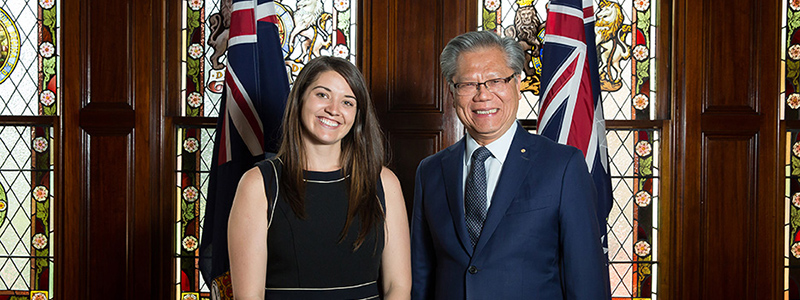Indigenous doctor is Rhodes Scholar for South Australia
Thursday, 26 October 2017

Outstanding University of Adelaide medical graduate Dr Claudia Paul has become the third Australian Indigenous person to be awarded a Rhodes Scholarship, having been named the 2018 Rhodes Scholar for South Australia.
Dr Paul, 24, a Wiradjuri woman from Broken Hill, will use her scholarship to undertake a Masters of International Health and Tropical Medicine at the University of Oxford from next year.
She is the University of Adelaide's 110th Rhodes Scholar since 1904.
One of the world's most prestigious scholarships, the Rhodes recognises outstanding academic achievement, character, leadership, and a commitment to community service.
The Governor of South Australia, His Excellency Hieu Van Le, AC, announced Dr Paul as the Rhodes Scholar for South Australia at a ceremony at Government House late yesterday.
Dr Paul says being awarded the Rhodes Scholarship is "breathtaking".
"I had a dream to study overseas but I didn't think it would ever happen," she says. "The Rhodes is something I never imagined applying for until fairly recently. Right now, it's a little overwhelming, but exciting."
Dr Paul follows in the footsteps of fellow University of Adelaide graduate Rebecca Richards, who in 2010 was the first Australian Indigenous person to be awarded a Rhodes Scholarship; and Tasmania's Bede Jones, announced as a Rhodes Scholar last year.
"I'm not the first Indigenous Rhodes Scholar – and that's awesome," Dr Paul says. "It's definitely special. To have started university just after Rebecca Richards was announced as a Rhodes Scholar felt very special to me.
"To walk that path, knowing that others have already walked it – it somehow feels a little easier now, more obtainable. And hopefully, by being an Indigenous Rhodes Scholar, I will help to make it feel a little easier again for the next person."
This year is also the 40th anniversary of the first Rhodes Scholarship to be awarded to a woman.
Raised and educated in Broken Hill, New South Wales, Dr Paul visited South Australia many times throughout her childhood, as her family often travelled to Adelaide for sport.
Dr Paul herself is an avid basketballer. "I thought I was going to play basketball forever – and then in Year 12, suddenly I started to click with my studies and to understand that I was able to achieve a lot more."
She pursued her dreams of working in health by applying for a Bachelor of Medicine and Bachelor of Surgery (MBBS) at the University of Adelaide. Because of her academic excellence, she was supported by a scholarship – and became the first member of her family to go to university.
But moving to Adelaide to study and getting used to uni life wasn't easy; Dr Paul admits she suffered from a lot of self-doubt in her first year.
"It was a massive adjustment. I even had the wrong bus timetable for the first few weeks!" she says. "My mum gave me some advice and told me to stick it out for 12 months. I'm glad I did because by the end of the year, I was loving my studies."
Dr Paul praised the "incredible culture" at the University of Adelaide's Medical School. "There is an inter-year-level support network from day one, where students from other years, who have been through it all, are able to give you guidance and advice. It's remarkable," she says.
During her time at the University of Adelaide, Dr Paul was a student representative with the Australian Indigenous Doctors Association, was active in a mentoring group that fostered links between Indigenous medical students and medical practitioners, and presented her research into the impact of cancer on Indigenous youth at the Australian Indigenous Doctors Association Conference in 2016.
In 2015, she was also named Young Citizen of the Year for Broken Hill.
Dr Paul is a strong advocate of rural and remote medicine, and has undertaken rural medical placements in Port Augusta and Whyalla in South Australia, and Broken Hill and Bourke in New South Wales.
"I've always thought about rural and remote health for as long as I can remember. Closing the Gap in healthcare is a very important issue to me, and has been for many years."
Dr Paul is currently completing a Master of Traumatology degree at the University of Newcastle, and is an intern at John Hunter Hospital.
She has her sights set on becoming one of the first female Indigenous surgeons in Australia – "there hasn't been one yet, but I'm sure there will be soon" – and eventually hopes to establish a surgical outreach service to rural and remote Australia, treating patients within their communities.
"My plan is to change the life of one patient at a time, one community at a time, and eventually reduce the morbidity and mortality of those suffering in outback Australia," she says.
The Rhodes Scholarship perpetuates the commitment to learning, research and humanity of businessman and philanthropist Cecil Rhodes, who died in 1902, leaving his estate to fund the Scholarship.
Candidates are selected on the basis of outstanding intellect, character, leadership, and commitment to service. The Rhodes Scholarships support students who demonstrate strong propensity to emerge as 'leaders for the world’s future'.
Contact details
Email: david.ellis@adelaide.edu.au
Website: https://www.adelaide.edu.au/newsroom/
Deputy Director, Media and Corporate Relations
External Relations
The University of Adelaide
Business: +61 8 8313 5414
Mobile: +61 (0)421 612 762







